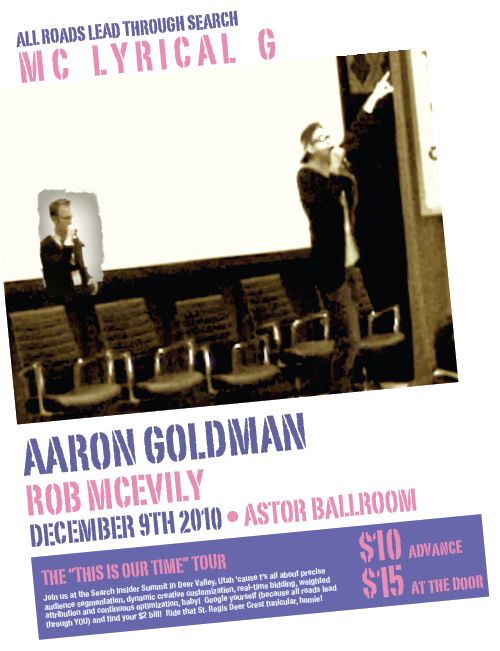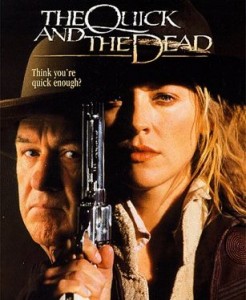
That’s the question I’ll be addressing on my panel at OMMA Global in New York today.
Here’s the prep sheet I sent to my panelists. Will update this post tomorrow with session highlights.
OMMA Global NY
9/28 at 11:30am
Is Google Taking Too Much Credit?
Google recently announced that its search and advertising tools generated $54 billion of economic activity in the U.S. in 2009. But, as we all know, there are a number of different factors that contribute to sales conversions both on and offline. In this session, we’ll examine the role of search in the media mix and discuss best practices for evaluating performance across all channels. We’ll also look at some of the more evolved attribution models being deployed by search marketing advertisers, agencies and technologies.
Moderator
Aaron Goldman, Chief Marketing Officer, Kenshoo
Panelists
Eli Goodman, Search Evangelist, comScore, Inc.
Greg A. Green, Director, Global Agency Strategy, Google
Justin Merickel, VP, Marketing and Product Development, Efficient Frontier
Peter Platt, Chief Digital Officer, Catalyst
Adam Kasper, SVP, Managing Director, Digital, Media Contacts
Thought-starters:
Is Google taking too much credit?
- See this post and video: http://googleblog.blogspot.com/2010/05/googles-us-economic-impact.html
- Download this report: http://www.google.com/economicimpact/
- Please be prepared to weigh in with your thoughts on the methodology and findings.
Budgeting
- Since SEM is so dependent on consumer demand/interest, it can be difficult to budget for it. What are some best practices?
- Should search be the first line item budgeted for or the last? Somewhere in between?
- What about SEO? How does one approach this unpaid media opportunity?
Attribution
- How can one measure “assists” solely within the search channel? (ie, upper funnel keywords)
- How can one measure impact of other online ads on search?
- How can one measure impact of offline ads on search?
- What tools are available to help with attribution?
Branding
- How does the conversation about attribution change when an advertiser has strict branding goals? (ie, no direct conversion/sales metric)
Future
- What will the digital marketing landscape look like in 5 years?
- What will Google’s role be?
- How will budgeting and attribution strategies evolve?
- How can marketers best prepare today?
Update:
Lots of great conversation and insights.
Key points:
Greg – studies show the overall value of the Internet between $300 billion and $1 trillion so $54b is a drop in the bucket. (Sounds awfully like the Google monopoly defense.) Attribution is not a zero sum game. The pot for all of digital is getting bigger.
Eli – when thinking about attribution, don’t forget about offline. Oh yeah, and comScore has tools to help you do that.
Justin – with Facebook ads now being integrated into SEM platforms such as Efficient Frontier and Kenshoo (disclosure: my employer), it’s critical to measure the interplay between channels.
Adam – you have to get the right people in the room from the client, agency, and technology partner side to have a real discussion about attribution. That includes marketing, IT, etc.
Peter – it’s critical to track lifetime value and segment customers by value when evaluating credit for each channel. Not all customers are created equal.
I did a bit of Geraldo and worked the crowd throughout to integrate audience Q&A. And I gave a signed copy of the book to the first person that asked a question. (Wisely, someone immediately shot up their hand and asked, “Can I get the book?”)
Here’s one of the brief moments I was actually up at the podium. You can’t tell but I’m wearing a green Google Me tee and matching Pumas.

At the end of the session I asked each of the panelists and then the audience which company they thought would be driving the lion’s share of economic impact via the web in 2015. The rough audience response was as follows:
80% Google
10% Other
5% Apple
2% Facebook (aided by presence of Kelly Graziadei from FB)
2% Microsoft
Update 2: Here’s a better pic courtesy of my colleague, Paula, at Kenshoo. Good view of the green ensemble.

Update 3: I just got another one of those phishing emails and was reminded of a great exchange during this session with Greg from Google.
As a follow up to his analysis of the economic impact study, I asked Greg if Google counted the millions in impact from the Prince of Nigeria floating funds through my account in the US.
Greg: How’d that investment work out for you?
Me: Can Google help me get my money back?
Greg: Sure. Send me your social security number.
Me: Don’t you already have it???















